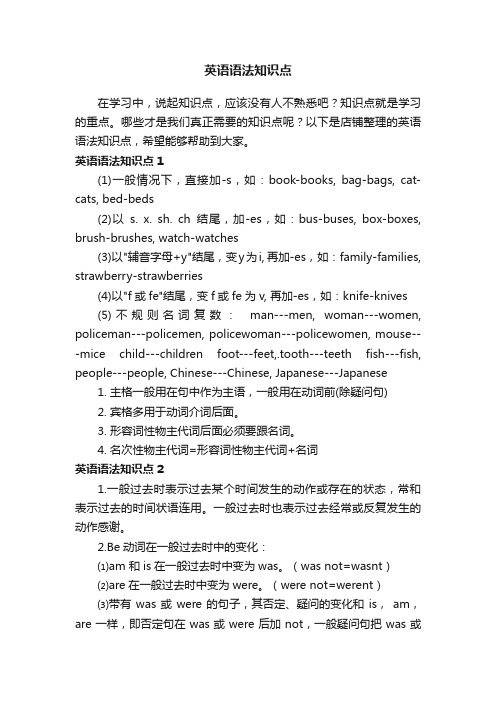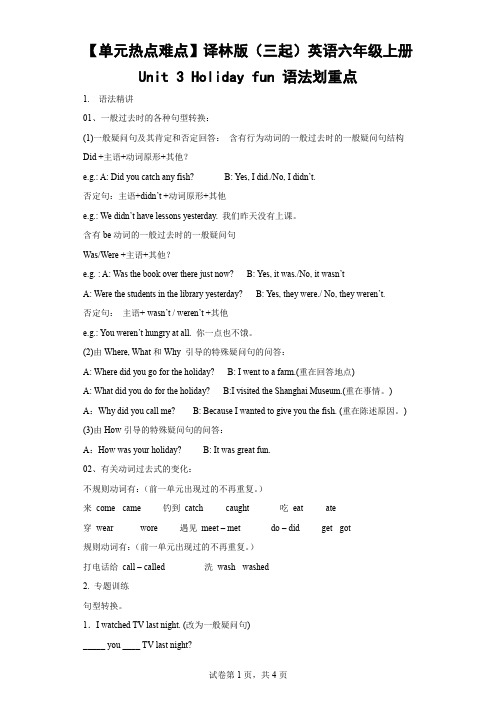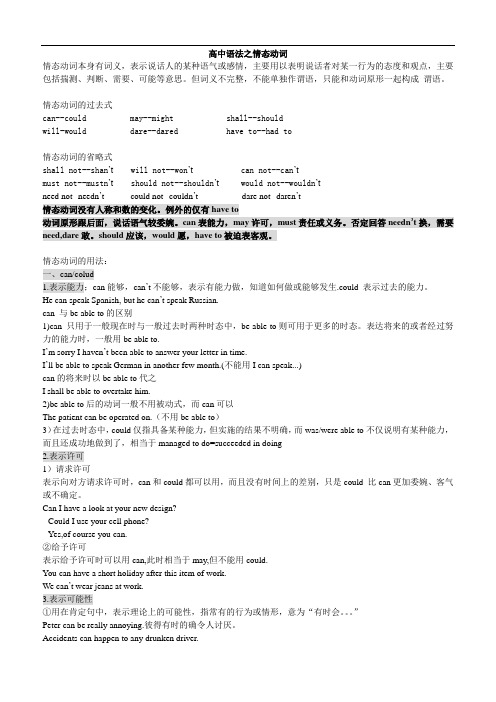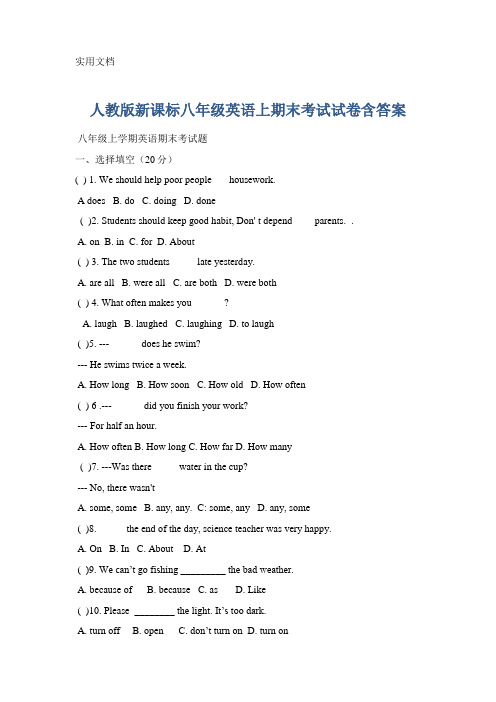can’t的过去式
6A第四单元课文讲解

Story time1 Six year ago, Mike could read and draw. 六年前,迈克会读和画。
Two days ago, I went to the supermarket .They watched a film three days ago .2 Twenty years ago, Mr Brown wrote letters to his friends.write letters to…写信给……write emails to ……写邮件给……【例句】I like writing letters to my good friends.3 He used the telephone at home and in the office to call people. 他在家和办公室使用电话给人们打电话。
use……to do……使用某物去做某事He uses forks to eat .We use pens to write .use( 动词)▬useful (形容词) 有用的4 He alse writes emails .alse 与too 变异alse 不用于句尾,而too 则通常用于句尾。
also 和too 都不可以用于否定句。
否定句中“也”用either 表示【例句】I like reading . I also like listening to music.He likes the T-shirt. She likes it too.5 Now he has a mobile phone and he can call people anywhere .现在他有一个手机,他可以在任何地给人打电话。
anywhere 用于否定句和疑问句。
表示在任何地方的句型。
I can’t see it anywhere .我哪儿也见不到它。
Did you go anywhere interesting ? 你去了什么的地方了吗?6 表示从某处买某物句型:buy……for 过去式bought……forI bought this book from Xinhua bookshop .7 表示来自世界各地的句型:from all over the worldNow she has e-friend from all over the world .现在她有来自世界各地的网友。
英语语法知识点

英语语法知识点在学习中,说起知识点,应该没有人不熟悉吧?知识点就是学习的重点。
哪些才是我们真正需要的知识点呢?以下是店铺整理的英语语法知识点,希望能够帮助到大家。
英语语法知识点1(1)一般情况下,直接加-s,如:book-books, bag-bags, cat-cats, bed-beds(2)以s. x. sh. ch结尾,加-es,如:bus-buses, box-boxes, brush-brushes, watch-watches(3)以"辅音字母+y"结尾,变y为i, 再加-es,如:family-families, strawberry-strawberries(4)以"f或fe"结尾,变f或fe为v, 再加-es,如:knife-knives(5)不规则名词复数:man---men, woman---women, policeman---policemen, policewoman---policewomen, mouse---mice child---children foot---feet,.tooth---teeth fish---fish, people---people, Chinese---Chinese, Japanese---Japanese1. 主格一般用在句中作为主语,一般用在动词前(除疑问句)2. 宾格多用于动词介词后面。
3. 形容词性物主代词后面必须要跟名词。
4. 名次性物主代词=形容词性物主代词+名词英语语法知识点21.一般过去时表示过去某个时间发生的动作或存在的状态,常和表示过去的时间状语连用。
一般过去时也表示过去经常或反复发生的动作感谢。
2.Be动词在一般过去时中的变化:⑴am 和is在一般过去时中变为was。
(was not=wasnt)⑵are在一般过去时中变为were。
(were not=werent)⑶带有was或were的句子,其否定、疑问的变化和is,am,are一样,即否定句在was或were后加not,一般疑问句把was或were调到句首。
【单元热点难点】译林版(三起)英语六年级上册Unit 3 Holiday fun 语法重点(含解析)

【单元热点难点】译林版(三起)英语六年级上册Unit 3 Holiday fun 语法划重点1. 语法精讲01、一般过去时的各种句型转换:(1)一般疑问句及其肯定和否定回答:含有行为动词的一般过去时的一般疑问句结构Did +主语+动词原形+其他?e.g.: A: Did you catch any fish? B: Yes, I did./No, I didn’t.否定句:主语+didn’t +动词原形+其他e.g.: We didn’t have lessons yesterday. 我们昨天没有上课。
含有be动词的一般过去时的一般疑问句Was/Were +主语+其他?e.g. : A: Was the book over there just now? B: Yes, it was./No, it wasn’tA: Were the students in the library yesterday? B: Yes, they were./ No, they weren’t.否定句:主语+ wasn’t / weren’t +其他e.g.: You weren’t hungry at all. 你一点也不饿。
(2)由Where, What和Why 引导的特殊疑问句的问答:A: Where did you go for the holiday? B: I went to a farm.(重在回答地点)A: What did you do for the holiday? B:I visited the Shanghai Museum.(重在事情。
)A:Why did you call me? B: Because I wanted to give you the fish. (重在陈述原因。
)(3)由How引导的特殊疑问句的问答:A:How was your holiday? B: It was great fun.02、有关动词过去式的变化:不规则动词有:(前一单元出现过的不再重复。
情态动词

高中语法之情态动词情态动词本身有词义,表示说话人的某种语气或感情,主要用以表明说话者对某一行为的态度和观点,主要包括揣测、判断、需要、可能等意思。
但词义不完整,不能单独作谓语,只能和动词原形一起构成谓语。
情态动词的过去式can--could may--might shall--shouldwill-would dare--dared have to--had to情态动词的省略式shall not--shan’t will not--won’t can not--can’tmust not--mustn’t should not--shouldn’t would not--wouldn’tneed not--needn’t could not--couldn’t dare not--daren’t情态动词没有人称和数的变化。
例外的仅有have to动词原形跟后面,说话语气较委婉。
can表能力,may许可,must责任或义务。
否定回答needn’t换,需要need,dare敢。
should应该,would愿,have to被迫表客观。
情态动词的用法:一、can/colud1.表示能力;can能够,can’t不能够,表示有能力做,知道如何做或能够发生.could 表示过去的能力。
He can speak Spanish, but he can’t speak Russian.can 与be able to的区别1)can 只用于一般现在时与一般过去时两种时态中,be able to则可用于更多的时态。
表达将来的或者经过努力的能力时,一般用be able to.I’m sorry I haven’t been able to answer your letter in time.I’ll be able to speak German in another few month.(不能用I can speak...)can的将来时以be able to代之I shall be able to overtake him.2)be able to后的动词一般不用被动式,而can可以The patient can be operated on.(不用be able to)3)在过去时态中,could仅指具备某种能力,但实施的结果不明确,而was/were able to不仅说明有某种能力,而且还成功地做到了,相当于managed to do=succeeded in doing2.表示许可1)请求许可表示向对方请求许可时,can和could都可以用,而且没有时间上的差别,只是could 比can更加委婉、客气或不确定。
人教版八年级英语(上)期末测试卷(含答案)

人教版新课标八年级英语上期末考试试卷含答案八年级上学期英语期末考试题一、选择填空(20分)( ) 1. We should help poor people___ housework.A does B. do C. doing D. done( )2. Students should keep good habit, Don' t depend____ parents. .A. onB. inC. forD. About( ) 3. The two students_____ late yesterday.A. are allB. were allC. are bothD. were both( ) 4. What often makes you______ ?A. laughB. laughedC. laughingD. to laugh( )5. ---______ does he swim?--- He swims twice a week.A. How longB. How soonC. How oldD. How often( ) 6 .---______ did you finish your work?--- For half an hour.A. How oftenB. How longC. How farD. How many( )7. ---Was there _____water in the cup?--- No, there wasn't_____A. some, someB. any, any. C: some, any D. any, some( )8. _____ the end of the day, science teacher was very happy.A. OnB. InC. AboutD. At( )9. We can’t go fishing _________ the bad weather.A. because ofB. becauseC. asD. Like( )10. Please ________ the light. It’s too dark.A. turn offB. openC. don’t turn onD. turn on( )11. We have ________ students this year than last year.A. manyB. much moreC. muchD. many more( )12. ---One is never ______ old ______learn. Do you think so?---Yes. I agree.A. very; toB. so; soC. too; toD. so; that( )13. ______ every day is good ________us.A. Running; atB. Running; forC. Run; forD. Run; at( ) 14. --What are you going to do ________ Sunday morning---I’m going to fly kites _______the park.A. in; inB. on; inC. at; onD. in; at( )15.Would you like________ now, John?A. sweet anything eatB. sweet anything to eatC. something sweet eatingD. something sweet to eat( )16. Elephants are very _____ and they often walk ______.A. quiet; quietB. quiet; quietlyC. quietly; quietD. quietly; quietly( )17. The number of the birds in the zoo ____about ninety.A. amB. isC. areD. Be( )18. He has ___________ for two years. Two years _____ a long time.A. left home ; areB. left home ; isC. been away from home ; isD. been away from home ; are( )19. ------- Mum , may I have some cakes?-------Sorry, there ’ s __________left in the box.A. nothingB. no oneC. noD. none( )20. I don’t know if it ___tomorrow. If it ___tomorrow, I will stay at home.A. rains, rainsB. will rain, rainsC. will rain, will rainD. rains, will rain二、完形填空(15分)Sam lived in a small village. His mother was often ill and he had to spend much money on _1 _ .And when he was twenty-eight, he borrowed (借)some _2 _ from his friends and married (结婚) .His wife was beautiful but came from a poor _3 _. So she couldn’t (can’t 的过去式) help him. She had to tell her husband to find work in the town. She hoped he would get _4 _ money to pay off (还清) his debt (债). The young man thought she was right and had to say _5 _ to he and started.The young man could not read or write. Of course _6_ would employ (雇) such a man like him in the town. He had to go an island (岛) and _7 _ trees for a farmer there. The island was small and there were only three men on it. They lived a _8 _ life and Sam missed (想念) his mother and wife very much. He wanted to _9 _ them, but he couldn’t. Luckily Charlie, who _10 _ f or five years, helped him. He asked the farmer (农民) to post the letter for him. From then on (从那时起)he _11_ the answer every day. About two months later the farmer brought (bring 的过去式) his wife’s letter to the island. He was very_12 _ but he didn’t read it. He had to ask Charlie to help him again.The farmer came out of the house and found Sam was stopping (捂着) Charlie’s while he was listening to the young man reading. It _14 _ him and he said, “What are you doing it for, Sam?”“I can’t let him _15_ my wife’s letter.”( )1.A. drinks B. fruit C.medicine D. newspapers( )2.A. clothes B. money C. houses D. cotton( )3.A. office B. school C. hill D. family( )4.A. enough B. little C. few D. several( )5.A. Sorry B. goodbye C.hello D. good morning( )6.A . nobody B. somebody C. everyone D. anyone( )7.A. burn (燃烧) B. buy C. break D. plant (种)( )8.A. light B. sad C. hard D. safe (安全的)( )9.A. look after B. write to C. call D. played with( )10.A. at home B. in hospital C. at work D. in school( )11.A. waited for B. heard from (收到) C. looked for D. looked up( )12.A. afraid B. carefull C. happy D. unhappy( )13.A. ears B. nose C. mouth D. eyes( )14.A. worried B. troubled (麻烦) C. interested D. surpried( )15.A. see B. hear C. write D. touch (摸)三、阅读理解(40分)AMr Smith had a surprise for his family. He took (take 的过去式) them out for their Sunday dinner. But his daughter Sue has a surprise (惊奇) for the family, too. Suddenly, she jumped up from the table. She ran to an old man sitting near her. Sheeeeee She smiled (微笑) at him and took his hand.“I’m so glad to see you!” Sue said.“Well, I’m glad to see you too,” the old man said.“You are wearing nice new clothes (衣服) today,” Sue said.“Thank you,” the man said.“I think about you often,” Sue said.The old man looked happy. So did Sue. Then she came back to her family.“Who is your friend?” Mr Smith asked her. Sue’s eyes opened wide. “Don’t you know?” she asked. “He is Father Christmas (圣诞老人)!I know him rightaway. But this is the first time I have seen (see的过去式) him in summer!( ) 1. When did Mr Smith’s family go out for dinner.A. On SaturdayB. On SundayC. On Sue’s birthdayD. On Christmas Day( ) 2. The story happened (发生)_______. (圣诞节前夕)A. in springB. in winterC. in summerD. On Christmas Eve( ) 3. Sue jumped up from the table because______.A. she saw an old manB. she became angryC. she saw her good friendD. she thought she saw Father Christmas ( ) 4. The old man _______.A. looked angryB. was wearing red clothesC. she was surprisedD. was Father Christmas( ) 5. Sue’s eyes opened wide bacause ______.A. she was angryB. she was happyC. she was surprisedD. she saw Father Christmas for first timeB根据短文内容选择正确答案。
情态动词用法归纳(全)

They shouldn't have concealed it from us . 他们本不应该对我们隐瞒那件事。
当表示“经过努力才得以做成功某事”时应用be able to,不能用Can。如:
He was able to go to the party yesterday in spite of the heavy rain.
2)表示客观可能性(客观原因形成的能力)
eg. The moon can not always be at the full. 月不可能常圆 If it's raining tomorrow,the sports can take place indoors.
1. How dare you say I’m unfair? 2. He daren’t speak English before such a crowd, dare he? 3. If we dared not go there that day, we couldn’t get the beautiful
may(might)有以下几种形式:
时态 现在式 过去式
肯定式 may might
否定式 缩略否定式
may not
mayn't
might not mightn't
mቤተ መጻሕፍቲ ባይዱy(might)的基本用法:
1)表可能,暗含不确定,等于possibly,perhaps,maybe,如: He may be busy getting ready for his trip. 他也许在忙于准备外出旅游。
can 表可能时指现在或将来。如: You can perhaps obtain a dog from the Dog's home.
can,can’t,could,couldn’t词汇辨析通用版六下

Dacy老师
定义
can, can't用于现在 could, couldn't用于过去 could是can的过去式
定义
前者主要是用在对过去的事情进行说明的时候。
A:你昨天为什么没有去打篮球? B:我不能逃课:I couldn't skip classes.
区别
1.can表示现在的能力,could表示过去的能力。 I can play basketball now , but I couldn't do it at all five years ago. 我现在会打篮球,但是五年前我一点都不会。
2.could可以用于虚拟语气,can不能。 How I wish I could fly into the sky! 我多么希望我能飞上天空!
9/15 NEXT
In 1820 people couldn’t travel to America by plane
but they __c_o_u__ld___ go there by boat.
10/15
NEXT
Babies __c_a_n___ sleep all day along
11/15 NEXT
用法
表示能力,现在或者过去想做就能做得到的能力。 She can swim very well now , but she could swim just a little two years ago. 现在她游泳非常好,但是两年前她只会一点点。
can和could后需要跟动词原形,没有人称和单复数的变化。
用法
表示许可,多用于口语。 Can I help you? 我可以帮助你吗?
外研版一年级起点小学五年级英语上册教案Module 7 Unit 2 It could find the people.

Module 7 Unit 2It could find the people.【教学目标】1.能够听说读写单词和短语:fire, find, stand on my hands, ride a bike。
能够听说认读单词 inside, special, firefighters.2.能够听说认读句子It could find the people. 能够听说句子The girl couldn’t walk then.The girl can walk now.【教学重难点】掌握can,can’t的一般过去式形式,并能在实际情景中进行运用。
【教学设计】首先通过图片让学生掌握单词can,can’t的一般过去式形式,其次通过播放录音,提问的方式引发学生思考,再次通过对比,使学生理解can与could,now和then的区别和用法,最后通过总结及口语交际,加强学生的语言应用能力。
【教学过程】一、教学导入1.教师出示一张Fifi 的图片。
T: What can Fifi do?What can’t Fifi do?Ss: Fifi can… Fifi can’t…2.教师出示一张Fifi 一年前的图片。
T: What could Fifi do then? What couldn’t Fifi do then?Help Ss learn “could, couldn’t”.结合图片引导学生理解could,couldn’t 是 can , can’t 的过去式。
二、新课呈现1.学习Look,listen and say部分。
(1)T:Did you go to the zoo last Sunday?S: Yes,we did.T:Do you see a special bird? It could speak.S:Yes. It’s the parrot.T:Yeah. Sam watched a TV show yesterday. What did he say? Let’s listen!(2)教师播放此部分的录音。
- 1、下载文档前请自行甄别文档内容的完整性,平台不提供额外的编辑、内容补充、找答案等附加服务。
- 2、"仅部分预览"的文档,不可在线预览部分如存在完整性等问题,可反馈申请退款(可完整预览的文档不适用该条件!)。
- 3、如文档侵犯您的权益,请联系客服反馈,我们会尽快为您处理(人工客服工作时间:9:00-18:30)。
can’t的过去式
在英语中,can't 是一个很常见的单词,它表示“不能、不会”。
而 can't 的过去式则是 couldn't,意思是“不能、不会(过去时)”。
那么,在什么情况下我们会用到 couldn't 呢?下面,我将从不同的角度为大家解释。
1. 语法角度
在语法上,couldn't 是 can 的过去式,表示过去某个时间点或某个时间段内,某件事情无法完成或无法做到。
比如:
- 当我尝试打开电脑时,它不能够启动。
When I tried to turn on my computer, it couldn't start up.
- 昨天我们没有成功地联系上他。
We couldn't get in touch with him yesterday.
2. 情感角度
可以说,can't 和 couldn't 这两个单词,都是表达情感时常用的词汇。
在情感上,couldn't 通常用来表示某个人或某个团体在某
个时刻或某个时间段内,无法做到某个事情,或者遇到了困难。
比如: - 我们的团队在这个项目上遇到了很多挑战,但我们一直在努力,直到最后我们成功地完成了它。
Our team faced a lot of challenges on this project, but we kept working hard and in the end, we couldn't have done it without each other.
- 在我的职业生涯中,我遇到了很多困难,但我一直在努力,直到我最终实现了我的梦想。
In my career, I faced a lot of
challenges, but I kept working hard and in the end, I couldn't be happier with where I am now.
3. 文化角度
在英语语境中,can't 和 couldn't 这两个单词,还有一些文化内涵。
比如,在英国文化中,can't 和 couldn't 经常用来表达某种礼貌。
比如:
- 如果你被邀请参加一个晚宴,但你不能参加,你可以说:I'm afraid I can't make it.(恐怕我不能来。
)
- 如果你想向某个人道歉,但你不确定他或她是否愿意接受你的道歉,你可以说:I couldn't be more sorry.(我再也不能更抱歉了。
)
4. 实用角度
最后,我们来看看 couldn't 在实际生活中的用法。
比如,在旅游中,如果你想问路,但你不会说当地语言,你可以这样说:
- Excuse me, do you speak English? I couldn't find my way to the train station.(打扰一下,你会说英语吗?我找不到去火车站的路。
)
总之,can't 和 couldn't 是英语中非常常用的单词,它们不仅仅代表着某种语法规则,还有着丰富的情感和文化内涵。
我们需要注意,不同的语境和场合下,can't 和 couldn't 的用法也会有所不同。
